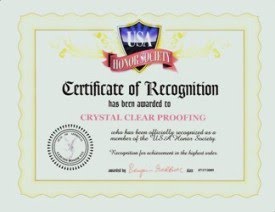Nearly answers how close to extinct wolves are/were. Adverbs answer the questions how, where, and when.
Adverbs do not get attached to adjectives with hyphens. Therefore, the adverb nearly, like most "ly" words, does not get hyphenated.
Only compound adjectives—adjectives that act as one idea with other adjectives—get hyphenated in front of nouns.
Example: The crowd threw out the barely edible cake.
The word barely is an adverb answering how edible the cake was.
Example: newly diagnosed disease
The word newly is an adverb answering when.
Example: We live in a two-story building.
The word two does not answer how, when, or where. It is acting as one idea with story to describe the noun building. Therefore, two-story is a compound adjective requiring a hyphen.
Example: The announcer offered a blow-by-blow description of the boxers' punches.
Blow-by-blow is acting as one idea. Therefore, it is a compound adjective.
Example: Our building is two stories.
When the description follows the noun, do not hyphenate.

Source: Grammarbook

































































I recently went through this with my copy editor. She was following the strict letter of the law when she inserted a lot of hyphens into my compound adjectives. However, to me, they made the read look clunky, and I requested that she not include them if the meaning was clear.
ReplyDeleteFor example, a hyphen is needed to clarify the meaning of small animal hospital vs small-animal hospital.
But when the meaning was clear enough, I disagreed with her insertions. The final editor allowed my choices to stand, so I guess there is still some leeway despite the "rules."
Terry
Terry's Place
Romance with a Twist--of Mystery
Love this!!! Thank you!!! I tend to hyphenate willy-nilly (yay!!) but this makes things clearer, thank you! Happy Wednesday too!
ReplyDeleteI need to bookmark this. I don't hyphenate enough. I'm sure you know that though.
ReplyDeleteThis comment has been removed by the author.
ReplyDeleteThank you! This was perfect!
ReplyDeleteWell now, this is something that I didn't know. I'm more of an instinctive grammarian (as opposed to, say, an English scholar), and although this makes total sense to me, I'm not sure I've ever seen it put so clearly into words. Thanks!
ReplyDeleteThis comment has been removed by a blog administrator.
ReplyDelete